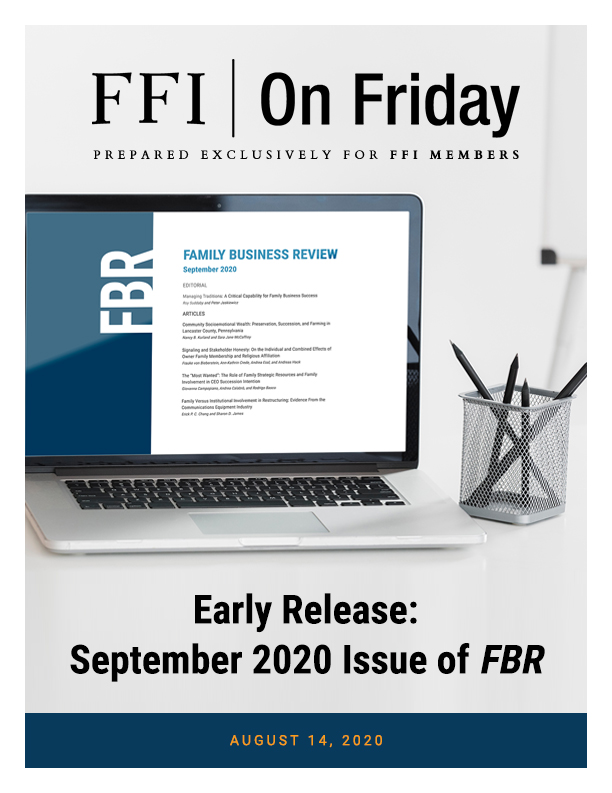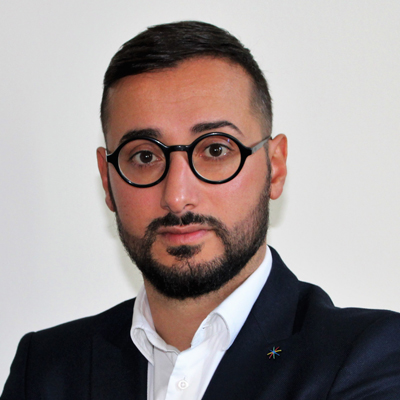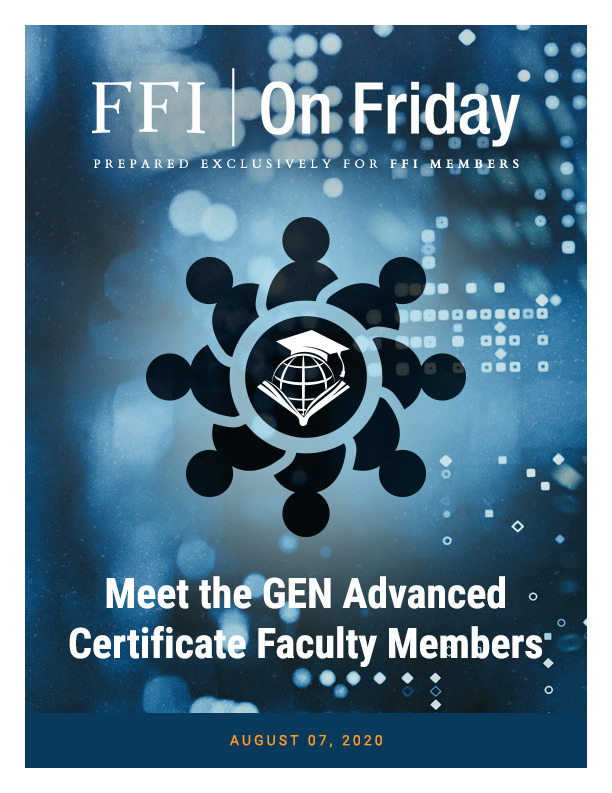Prepared Exclusively for FFI Members
Early Release: September 2020 Issue of FBR
August 14, 2020
W
e are pleased to provide you with an advance look at the September 2020 issue of Family Business Review (FBR).
As an FFI member, you have access to the complete library of FBR articles at no charge.
To access back issues of FBR, follow these instructions:
- Log in to your FFI member account
- Then click: my.ffi.org/page/family-business-review
- Click the link on this page to go to Family Business Review and you will automatically be redirected and logged in to FBR to begin reading.
EDITORIAL
Managing Traditions: A Critical Capability for Family Business Success
Roy Suddaby and Peter Jaskiewicz
Roy Suddaby and Peter Jaskiewicz
The authors focus on traditions and on the role they play in the success of family businesses. Suddaby and Jaskiewicz argue that “family business success and longevity are directly correlated with the capacity to successfully manage the creation, maintenance, and intergenerational transmission of traditions.”
Roy Suddaby
University of Liverpool
University of Victoria
University of Liverpool
University of Victoria
Peter Jaskiewicz
University of Ottawa
University of Ottawa
Articles
Community Socioemotional Wealth: Preservation, Succession, and Farming in Lancaster County, Pennsylvania
Nancy B. Kurland and Sara Jane McCaffrey
Nancy B. Kurland and Sara Jane McCaffrey
Research Questions
- Can SEW theory expand from the family unit to explain endowment preservation at a community level of analysis?
- How can we understand the strategic logic of family business owners who choose to preserve their farmland?
- Does Community SEW imply that social relationships in the community may supersede intergenerational family ties?
- How does Community SEW expand Berrone et al.’s (2012) FIBER dimensions of SEW?
Implications for Practice
- This research provides insight for policy makers and social entrepreneurs. With an understanding of how managers at family-owned businesses seek returns on the community level, local leaders can structure regulations and programs to elicit Community SEW desires, and encourage family business leaders to pursue pro-social policies.
- This research provides insights for the localism movement. Members of the localism movement might consider the role of a Community SEW to influence decisions by controlling families to reinforce a local-based economy. Controlling business families will retain ownership, as they value maintaining their community’s uniqueness over the profit they could gain by “selling out” to a corporate chain.
Nancy B. Kurland
Franklin & Marshall College
Franklin & Marshall College
Sara Jane McCaffrey
University of Pennsylvania
University of Pennsylvania
Signaling and Stakeholder Honesty: On the Individual and Combined Effects of Owner Family Membership and Religious Affiliation
Frauke von Bieberstein, Ann-Kathrin Crede, Andrea Essl, and Andreas Hack
Frauke von Bieberstein, Ann-Kathrin Crede, Andrea Essl, and Andreas Hack
Research Questions
- Is owner-family membership of managers an effective signal to elicit honest behavior by a firm’s external stakeholders?
- Is religious affiliation of managers an effective signal to elicit honest behavior by a firm’s external stakeholders?
- Are family managers perceived as more religious?
- Is there a reinforcing effect of owner-family membership and religious affiliation of managers in eliciting honest behavior by a firm’s external stakeholders?
Implications for Practice
- Family managers can increase stakeholders’ honesty by signaling their owner-family membership. This finding supports the inherent value of the family firm signal and suggests this specific characteristic to be publicly accentuated.
- Family managers can increase stakeholders’ honesty by signaling their religious affiliation. Hence, religiosity still seems to be important and should be signaled to stakeholders.
- The combination of both signals reinforces the effect of increased honesty, suggesting that religiously oriented family managers can increase the chances to operate with honest stakeholders by publicly underlying their owner-family membership and religiosity.
Frauke von Bieberstein
University of Bern
University of Bern
Ann-Kathrin Crede
University of Bern
University of Bern
Andrea Essl
University of Bern
University of Bern
Andreas Hack
University of Bern
University of Bern
The “Most Wanted”: The Role of Family Strategic Resources and Family Involvement in CEO Succession Intention
Giovanna Campopiano, Andrea Calabrò, and Rodrigo Basco
Giovanna Campopiano, Andrea Calabrò, and Rodrigo Basco
Research Questions
- What strategic family resources affect CEO succession intention in a family business?
- To what extent does family involvement have an effect on the strategic family resources-CEO succession intention relationship?
Implications for Practice
- To thoughtfully handle succession processes, it is important to acknowledge what family strategic resources determine a competitive advantage before the succession event actually happens.
- The effect of human capital on the preference for a non-family successor suggests that family firms consider skills and experience to be so important for sustained competitive advantage that they will opt for a professionalized business.
- The careful assessment through a priority “checklist” of the core family strategic resources can enlighten the process of succession planning.
- To effectively exploit family strategic resources it is fundamental to match this “checklist” that helps identify which family strategic resources can be an asset rather than a liability for the future of the family firm with the most fitting composition of the TMT that will effectively use those resources.
Giovanna Campopiano
Lancaster University
Lancaster University
Andrea Calabrò
IPAG Business School
IPAG Business School
Rodrigo Basco
American University of Sharjah
American University of Sharjah
Family Versus Institutional Involvement in Restructuring: Evidence From the Communications Equipment Industry
Erick P. C. Chang and Sharon D. James
Erick P. C. Chang and Sharon D. James
Research Questions
- How the decision to restructure can be perceived differently for both family and institutional owners.
- How do family-controlled publicly-traded firms in financial distress manage the tension between achieving economic and non-economic goals?
- What effect does a corporate restructuring have on retaining family control in a publicly traded firm?
Implications for Practice
- Family leaders may need to build an endowment of social skills to manage external pressures that can dilute the family’s role in corporate governance before going public.
- Family leaders may need to balance the interests of non-family investors in pursuit of economic returns with their efforts to pursue noneconomic goals.
- Family owners of publicly-traded firms may need to establish mechanisms for incorporating and/or promoting family members to preserve future social-emotional wealth.
Erick P. C. Chang
Arkansas State University
Arkansas State University
Sharon D. James
Arkansas State University
Arkansas State University
Previous Edition
This week we are proud, pleased, and enthusiastic about featuring the eight faculty members who serve in the Advanced Certificate program and teach the required courses in these two program. Here they are with some of their thoughts on why they participate in this important FFI educational initiative.
AUG
19
19
Join the FFI Midwest Chapter for a virtual meeting on August 19.
view details and register – you don’t have to be in Chicago!
view details and register – you don’t have to be in Chicago!
SEP
1
1
Last day to enroll in Q3 GEN courses.
view details
view details
SEP
15
15
Deadline for 2086 applied research proposal submissions.
1. The Future of Work and Its Implications for Practice with Multi-generational Family Enterprises
learn more and submit
2. The Role of the Advisor in Fostering Family Enterprise Governance Durability
learn more and submit
1. The Future of Work and Its Implications for Practice with Multi-generational Family Enterprises
learn more and submit
2. The Role of the Advisor in Fostering Family Enterprise Governance Durability
learn more and submit
OCT
1
1
Last day to register for the 2020 Virtual Global conference.
Space is limited, so don’t delay.
view details
Space is limited, so don’t delay.
view details














